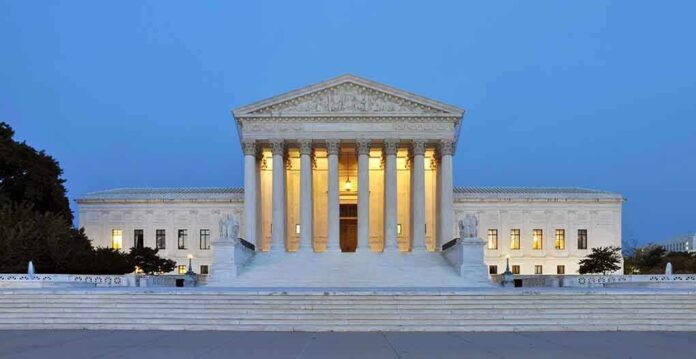The Supreme Court will decide whether parents have the right to opt their children out of gender ideology instruction in public schools, potentially reshaping the balance between parental authority and educational mandates nationwide.
Quick Takes
- The Supreme Court case Mahmoud v. Taylor challenges Montgomery County, Maryland’s policy requiring all students to participate in gender and sexuality curricula with no opt-out option.
- Over 300 religious parents have joined the lawsuit, arguing the policy violates their First Amendment rights and religious freedom.
- Lower courts ruled in favor of the school district, determining parents cannot exempt children from objectionable public school material.
- The Ethics & Religious Liberty Commission filed an amicus brief supporting parents as primary educators with fundamental rights to direct their children’s education.
- A decision is expected in June 2025 and could set a major precedent for religious accommodations in public education nationwide.
Critical Rights at Stake in Supreme Court Battle
The Supreme Court has agreed to hear oral arguments in Mahmoud v. Taylor, a case that directly challenges the boundaries between parental authority and public education mandates. At the center of the dispute is Montgomery County Board of Education’s 2022 policy requiring the use of storybooks promoting gender and sexuality inclusivity in classrooms. The policy initially allowed parents to opt their children out of this instruction, but school officials later reversed this decision, mandating participation for all students regardless of family religious beliefs or values. This reversal prompted a coalition of more than 300 religious parents to file a lawsuit claiming violation of their constitutional rights.
Abigail, stop lying to us!
You claim to “understand the challenges parents face” in Virginia’s public schools, but your record proves the opposite. You have consistently prioritized radical ideology over the well-being of students, ignored parents’ rights, and promoted policies…
— Elicia Brand #IStandWithIsrael. (@EliciaBrand) February 4, 2025
The case raises fundamental questions about whether public schools can compel student participation in curriculum elements that conflict with families’ deeply held religious convictions, particularly without providing notification or opt-out provisions. Lower courts have thus far sided with the school district, ruling that parents do not have the right to exempt their children from objectionable public school curricula. The Supreme Court’s decision to hear the case signals its recognition of the significant constitutional questions at stake regarding both religious liberty and parental rights in education.
Parental Rights vs. Educational Authority
The Supreme Court has historically recognized parents’ fundamental right to direct the upbringing and education of their children. This principle has deep philosophical and legal roots, acknowledged by historical figures like Thomas Aquinas and John Locke, and affirmed in landmark decisions such as Meyer v. Nebraska. The current case challenges whether schools can override these established parental rights in service of educational policies promoting diversity and inclusion. Petitioners argue that the Montgomery County policy infringes on parental authority, religious liberty, and constitutes government-compelled speech in violation of the Free Exercise Clause.
The Southern Baptist Convention wrote in their “On the God-Given Rights and Responsibilities of Parents” that parents have the freedom to make decisions regarding the upbringing, education, and healthcare of their children without undue interference, recognizing that parents are the primary arbiters of a child’s moral and spiritual formation.”
School officials and respondents counter that public education should be neutral and not subject to individual parental exemptions, arguing that the inclusive curriculum serves the greater public interest by promoting diversity and acceptance. They maintain that allowing opt-outs would undermine educational objectives and potentially enable discrimination. This position reflects a growing tension in public education between traditional views of parental authority and newer perspectives prioritizing institutional expertise in determining appropriate content for all students regardless of family values.
Broader Implications for Schools Nationwide
The Supreme Court’s eventual ruling will have far-reaching consequences beyond Montgomery County. According to Heritage Foundation research, over 1,000 school districts across the country have implemented policies that exclude parents from knowing about or participating in their children’s gender identity decisions at school. These policies typically include treating a student’s communicated gender identity as conclusive, requiring school personnel to use preferred names and pronouns, and prohibiting communication with parents without the student’s permission—practices that many religious families find deeply problematic.
According to U.S. Secretary of Education Linda McMahon, “Parents are the most natural protectors of their children. Yet many states and school districts have enacted policies that imply students need protection from their parents. These states and school districts have turned the concept of privacy on its head—prioritizing the privileges of government officials over the rights of parents and well-being of families.”
The U.S. Department of Education recently addressed some of these concerns through a Dear Colleague Letter emphasizing schools’ obligations under FERPA and PPRA to allow parents to review all education records of their children, including documents related to a student’s gender identity. However, the Supreme Court’s decision will provide the most definitive guidance on whether parents have a constitutional right to exempt their children from instruction that conflicts with their religious beliefs. A ruling in favor of parents could strengthen parental rights nationwide and establish new precedents for religious accommodations in public education. Conversely, a ruling supporting the school district could significantly limit parents’ ability to shield their children from curriculum content they find objectionable on religious grounds.
Sources:
- https://erlc.com/resource/explainer-supreme-court-to-hear-case-on-parental-rights-and-religious-liberty-in-public-schools/
- https://www.heritage.org/gender/report/public-school-gender-policies-exclude-parents-are-unconstitutional
- https://www.ed.gov/about/news/press-release/us-department-of-education-directs-schools-comply-parental-rights-laws











